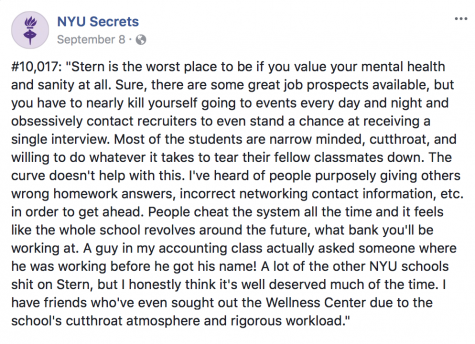Many Try, Few Succeed — Improving Stern Mental Health
Many Stern students feel intense academic stress resulting from the competitiveness of the school. A few organisations on campus are working to combat these issues.
October 30, 2017
Along with a handful of other clubs within the school, the Stern Student Council hosted a “Breaking Point Panel” on May 3. The event featured a panel of upperclassmen in the Stern School of Business who spoke openly to a full room about when they reached their breaking points due to academic-induced stress.
Kaan Tuncel, a Stern senior, was one of the panelists. He was invited to speak because of his prior involvement with the Stern Student Council. Tuncel said the event was relaxed — more like a discussion. Like other panelists, he talked about when he’d reached his breaking points at Stern and how he learned to overcome challenges with his mental health.
“For me, it was a combination of reading about mental resilience and pondering,” Tuncel said. “Almost like meditation.”
Tuncel believes that intense stress is definitely a problem within Stern but is also a function of studying at a competitive school. He thinks that NYU attracts students who are high-achieving but neurotic in nature, which means that stress is natural, but nonetheless needs to be addressed.
“Any normal human being — when dealing with the stuff you have to deal with — would be stressed,” Tuncel said.
Stern is a competitive school and is increasing in its selectivity every year. Although NYU spokesperson John Beckman said the university does not have data specific to the acceptance rate for Stern, he did confirm that its acceptance rate has decreased each year. According to a Poets and Quants post from Dec. 2016, Stern’s acceptance rate was 12 percent.
In interviews, students and administrators both agreed that Stern students deal with a lot of academic stress. Although the “Breaking Point Panel” was a one time event, it is indicative of a larger, overarching issue that both administrators and students have attempted to tackle for years — people don’t want to talk about mental health.
The Stern Student Council views the mental health of students as a priority, according to Stern senior and Stern Student Council President Bill Tsai. Consequently, the council has worked with Stern administrators to form a new committee, the Health and Wellness Committee.
The committee is co-chaired by Stern senior Justin Lochan and Stern senior Christine Gal — two long-time members of the Stern Student Council — and is still in its early phases. The duo explained that the initiative was inspired in part by Stern Thoughtful — an advisory panel made last year to combat the issue of mental health in Stern. The former committee was conceived by the Stern Student Council and leaders from the Stern Inter-Club Council, with help from the Office of Student Engagement.
Although Stern Thoughtful only held one event last year before morphing into the new council, the Health and Wellness Committee, former Stern Freshman Class Vice President Antonio Di Meglio said the implications of the committee’s existence were powerful.
“The whole thing materialized completely within the last two months of the last school year,” Di Meglio said. “Just creating an established committee on mental health was an achievement for Stern by itself. Baby steps, but we’ll get there.”
Tsai said that with the new committee, the Stern Student Council hopes to create an overarching dialogue about mental health within Stern, because the conversations predominantly happen one-on-one between students and their mentors. The committee will highlight resources on campus, and will provide a forum for students to meet and discuss possible initiatives.
“There is no one reason we started this committee,” Tsai said. “We just started out the school year, as seniors, and thought that now is our chance to take on what we think is important for underclassmen to have an idea about, which is that mental health is important. We all have stress induced from academics; from career-finding; from work — it’s not specific to Stern.”
Stern administrators were also quick to point out that academic stress is not limited to Stern. However, Assistant Dean of Academic Advising and Judicial Affairs Tiffany Boselli did note that the climate in Stern has changed slightly because recruitment for jobs has moved forward. Instead of starting the job search in junior year, students are interviewing and applying as sophomores.
Beckman added that the recruitment process at Stern slightly differentiates it from other schools in the sense that it is more of an undergraduate professional program. Hence, the pressure of recruitment is an additional stress that hits Stern students a little harder than students of other schools.
“In addition to the goal of getting a degree, there is the additional goal of getting recruited into a firm,” Beckman said. “That cycle used to start later in an undergraduate course of study and it has creeped earlier and earlier. I think that goal of not only getting a degree but getting recruited is an additional goal to other schools.”
Boselli, along with the Office of Student Engagement, worked closely with the Stern Student Council in developing the new committee. She said the Stern administration supports this new effort 100 percent, and believes that a collaboration between the students and the administration is the best way to encourage conversation on a topic that administrators have been trying to grapple with for years.
“It can’t just be us, we’ve tried so many things,” Boselli said. “Sometimes we get good attendance [at events] and sometimes we don’t, but it’s going to take all of us working together and we need the stigma [of talking about mental health] to be gone.”
Jane Chinock, a 2016 graduate of Stern and the College of Arts and Science, said that the cut-throat culture of Stern is not just a stereotype. She said if you don’t have a strong sense of self-confidence and security, you will crumble under the competition of Stern and the constant state of comparing yourself to others. She said the inability to trust classmates is the root of mental health problems within the school.
“I think that mental health is generally stigmatized, but I don’t think that’s the issue in Stern,” Chinock said. “I think that people look at others and think they’re striving, and you feel like it’s just you that’s not doing so well. That’s the reason why it’s not so widely publicized.”
In contrast to Stern administrators who argued that students across all schools face similar levels of stress, Chinock said there is a palpable contrast between CAS and Stern in terms of students’ attitudes.
“[CAS] was less competitive than Stern — again that competitiveness means that you try extra hard and it creates an environment where you strive for perfection,” Chinock said. “That’s a good thing. But the bad thing is that [in Stern] you have examples of people who are giving other people wrong answers; people who are tutoring people wrong. That creates an environment in which you don’t know who to trust.”
She said from her experience, if you are in CAS and put in the work and effort, you will likely receive results accordingly. However, it is not the same case in Stern, which leads to added pressure for students.
There is a limit on how many people can get high grades in some Stern courses, according to NYU Stern’s grading standards. These guidelines state that in core classes of over 25 students, approximately 35 percent of students will receive an A or A-.
In these classes another student’s loss could mean your gain.
Chinock said that she was impacted by these policies during her time at Stern when she did well percentage-wise on an exam but did not receive a proportional grade.
Although Beckman said the university does not disaggregate data on school-specific grade point averages, data from the last academic year illustrates Stern as rivaling the School of Professional Studies, the Tandon School of Engineering and CAS for the lowest GPA cutoff for graduating with honors. To graduate Summa Cum Laude from Stern, students need a 3.879, while the majority of the other nine schools at NYU require a GPA in the 3.9+ range.
Boselli said that the creation of a committee like the Health and Wellness Committee as a solution seems so obvious now, but in the past the administration tried other efforts like placing a Wellness Center table at Stern events and hosting puppy therapy sessions. The efforts were met with varying levels of interest from the student body, but Boselli said that the administration has continued to focus on promoting wellness within the school and discourage students from viewing each other as competition.
Some efforts have been more successful than others. According to Boselli, a system called Adviser Alerts, which is being used by a number of schools within NYU, is a practical way for the Stern administration to monitor the wellbeing of students. Adviser Alerts is coordinated by the registrar so that if faculty members are worried about a student, they can click on the student’s name by the class roster, and a notification will be sent directly to the student’s adviser in Stern.
“It’s a great way for the faculty to be able to quickly tell us, and they do; we get those alerts and we are calling you in and calling in the professor to learn more,” Boselli said. “I can tell you, not a day goes by when I don’t get an email or a phone call from a Stern professor and sometimes non-Stern professors saying, ‘we’re worried about this student.’”
The Student Health Center has seen an increase in the number of Stern students seeking mental health services, according to Assistant Vice President of NYU Student Mental Health Zoe Ragouzeos. But this increase is not limited to Stern alone.
“In terms of utilization, while it is true that there has been an increase in Stern students who have availed themselves of mental health services over the last five years, a similar trend is seen at other schools as well — CAS, Tisch [School of the Arts], Gallatin [School of Individualized Study], Steinhardt [School for Culture, Education and Human Development], et cetera,” Ragouzeos said. “As is the case nationally, our NYU Counseling services, and in fact our Student Health Center, has seen an increase in student utilization over the last five years.”
She said that the Student Health Center considers this trend to be a positive indication that students know where to access care and are taking the time to invest in their own health and wellness.
Increased conversation on the subject of mental health seems to be the goal of all parties involved: the Stern administration, the Stern Student Council and the Student Health Center. Chinock said that efforts to destigmatize mental health are vital. When she was a student, she thought she was alone in her struggles. It was only when she began seeing posts on NYU Secrets — a Facebook page where NYU students submit anonymous stories — that she realized her experience was not unique.

“People probably don’t talk about it because they think that other people aren’t going through it,” Chinock said.
A version of this article appeared in the Monday, Oct. 30 print edition. Email Jemima McEvoy at [email protected].


























































































































































